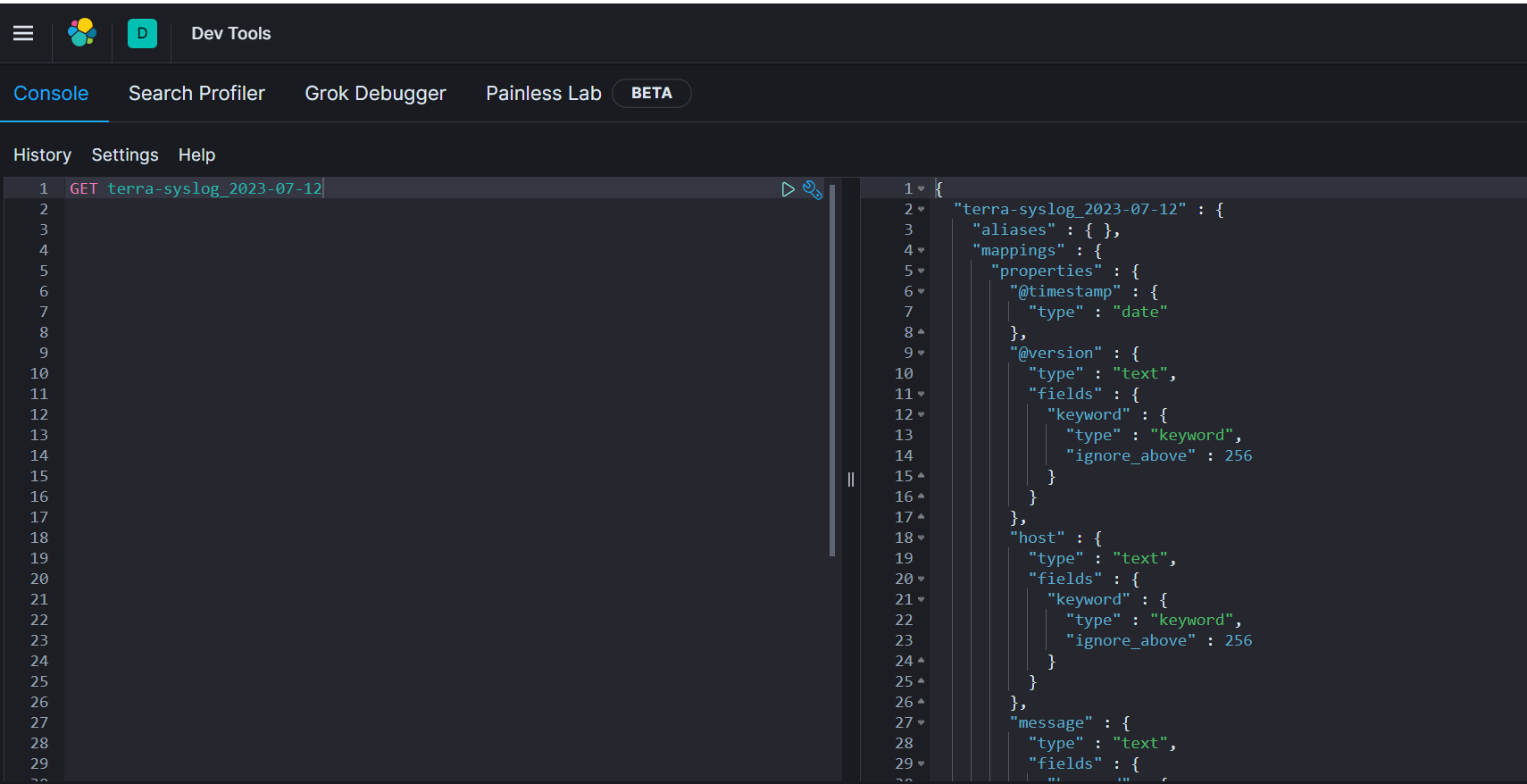ES 实战复杂sql查询、修改字段类型
转载请注明出处:
1.查询索引得 mapping 与 setting

get 直接查询 索引名称时,会返回 该 索引得 mapping 和 settings 得配置,上述返回得结构如下:

{ "terra-syslog_2023-07-12" : { "aliases" : { }, "mappings" : { "properties" : { "@timestamp" : { "type" : "date" }, "@version" : { "type" : "text", "fields" : { "keyword" : { "type" : "keyword", "ignore_above" : 256 } } }, "host" : { "type" : "text", "fields" : { "keyword" : { "type" : "keyword", "ignore_above" : 256 } } }, "message" : { "type" : "text", "fields" : { "keyword" : { "type" : "keyword", "ignore_above" : 256 } } }, "received_at" : { "type" : "date" }, "received_from" : { "type" : "text", "fields" : { "keyword" : { "type" : "keyword", "ignore_above" : 256 } } }, "syslog_facility" : { "type" : "text", "fields" : { "keyword" : { "type" : "keyword", "ignore_above" : 256 } } }, "syslog_facility_code" : { "type" : "long" }, "syslog_hostname" : { "type" : "text", "fields" : { "keyword" : { "type" : "keyword", "ignore_above" : 256 } } }, "syslog_message" : { "type" : "text", "fields" : { "keyword" : { "type" : "keyword", "ignore_above" : 256 } } }, "syslog_program" : { "type" : "text", "fields" : { "keyword" : { "type" : "keyword", "ignore_above" : 256 } } }, "syslog_severity" : { "type" : "text", "fields" : { "keyword" : { "type" : "keyword", "ignore_above" : 256 } } }, "syslog_severity_code" : { "type" : "long" }, "syslog_timestamp" : { "type" : "text", "fields" : { "keyword" : { "type" : "keyword", "ignore_above" : 256 } } }, "tags" : { "type" : "text", "fields" : { "keyword" : { "type" : "keyword", "ignore_above" : 256 } } }, "type" : { "type" : "text", "fields" : { "keyword" : { "type" : "keyword", "ignore_above" : 256 } } }, "user" : { "type" : "text", "fields" : { "keyword" : { "type" : "keyword", "ignore_above" : 256 } } } } }, "settings" : { "index" : { "creation_date" : "1689137630855", "number_of_shards" : "1", "number_of_replicas" : "1", "uuid" : "Qew4uoNUQ9q8-JQDPTWVPw", "version" : { "created" : "7080199" }, "provided_name" : "terra-syslog_2023-07-12" } } } }
2. 执行复杂条件得查询:

该dsl 为:
GET terra-syslog_2023-07-15/_search { "size": 0, "query": { "bool": { "must": [ { "wildcard": { "syslog_program.keyword": { "wildcard": "*SSH_USER_LOGIN*", "boost": 1 } } } ], "adjust_pure_negative": true, "boost": 1 } }, "aggregations": { "time_agg": { "date_histogram": { "field": "received_at", "format": "EEE", "fixed_interval": "1d", "offset": 0, "order": { "_key": "asc" }, "keyed": false, "min_doc_count": 0 }, "aggregations": { "user_agg": { "terms": { "field": "user.keyword", "size": 10, "min_doc_count": 1, "shard_min_doc_count": 0, "show_term_doc_count_error": false, "order": [ { "_count": "desc" }, { "_key": "asc" } ] } } } } } }
这段 DSL 具有以下作用:
-
"size": 0: 设置返回的结果集大小为 0,即只返回聚合结果,不返回匹配的文档。 -
query部分:构建了一个布尔查询,包含多个exists和range子查询,用于过滤符合条件的文档。-
exists子查询检查指定字段是否存在,这里依次检查了source.ip、source.port、destination.ip、destination.port、host.name和flow.rep_tags字段的存在。 -
range子查询指定了对@timestamp字段进行范围筛选,从给定的时间戳范围中选择满足条件的文档。
-
-
aggregations部分:定义了聚合操作,通过terms聚合按照host.name字段进行分组,并计算每个组内的文档数。-
terms聚合将按照host.name字段的值进行分组。设置size为最大整数2147483647,以确保返回所有分组。 -
min_doc_count设置为 1,表示只返回至少拥有一个文档的分组。 -
shard_min_doc_count设置为 0,表示在单个分片上没有要求文档数量的最小要求。 -
show_term_doc_count_error设置为 false,不显示术语文档计数错误。 -
order指定了排序规则,首先按照分组中的文档数_count降序排序,然后按照host.name字段的值升序排序。 -
在
terms聚合内部定义了一个子聚合cardinality,用于计算每个分组内唯一组合的数量。这里通过拼接source.ip、source.port、destination.ip和destination.port字段的值来作为唯一标识。
-
该 DSL 查询的作用是在给定时间范围内,统计满足一系列条件(存在指定字段)的文档,并按照 host.name 进行分组并计算每个组内唯一组合的数量。
另外,在查询时,使用 _search 可以执行DSL, 如果没有_search 时,可以查询该索引得文档结构类型,以及该索引得副本、分片等信息
3.修改 该 索引得 mapping 中得字段类型
将前面的映射中的 syslog_timestamp 字段类型修改为日期类型(date),需要更新映射定义并重新创建索引。
-
删除现有的索引,或者创建一个新的索引。
-
更新映射定义,将
syslog_timestamp的类型更改为 "date"。以下是更新后的映射示例:
{ "mappings": { "_doc": { "properties": { // 其他字段... "syslog_timestamp": { "type": "date" }, // 其他字段... } } } }
- 使用上述修改后的映射定义来创建索引或更新现有索引的映射。可以使用 Elasticsearch 的 RESTful API 或管理工具(如 Kibana Console)执行以下请求:
PUT terra-syslog_2023-07-15 { "mappings": { "_doc": { "properties": { // 其他字段... "syslog_timestamp": { "type": "date" }, // 其他字段... } } } }
这样,syslog_timestamp 字段的类型就会被修改为日期类型,并可以存储、索引和查询日期值。根据数据的格式和需求,Elasticsearch 会自动解析日期字符串并将其转换为适当的日期对象。




